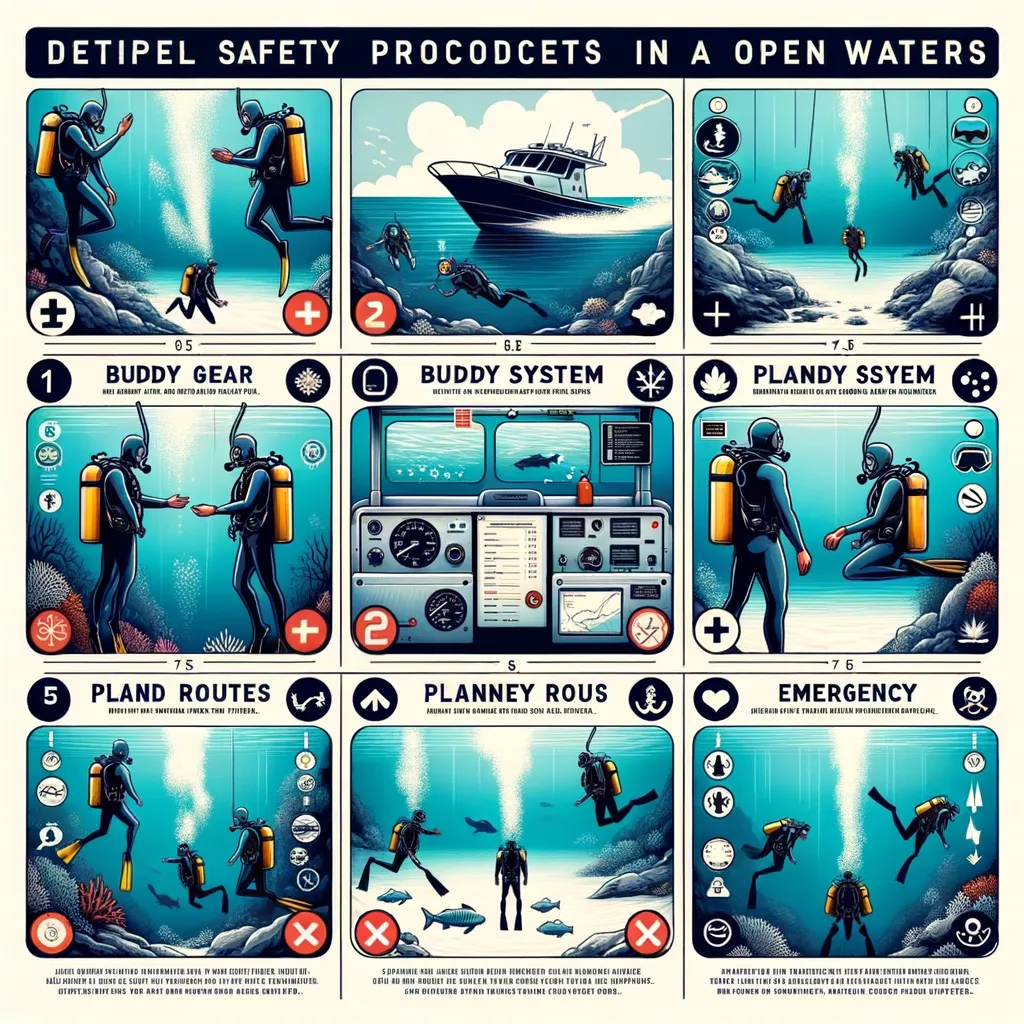Ensuring Safety: Protocols for Diving in Open Waters
Welcome to our comprehensive guide on Ensuring Safety: Protocols for Diving in Open Waters. As parents, the safety of our children is always a top priority, especially when embarking on adventures that involve the great outdoors. Diving in open waters can be an exhilarating experience for you and your family. It offers a unique opportunity to explore the wonders of underwater life and create unforgettable memories together. However, it also requires thorough preparation and adherence to safety protocols to ensure that everyone stays safe and enjoys the experience to the fullest. In this guide, we will walk you through the essential safety protocols for diving in open waters, providing you with the knowledge you need to protect your loved ones. For additional resources on outdoor adventures, please visit Outdoors and for camping insights, check out Camping info.
Understanding the Basics of Open Water Diving
Open water diving presents a unique set of challenges and risks that are significantly different from those encountered in a controlled environment like a swimming pool. Understanding these differences is the first step towards ensuring a safe diving experience. This section will cover the fundamental concepts of open water diving, including the importance of proper training, the variety of conditions you might face, and the essential gear required for a safe dive.
Choosing the Right Training Program
Before diving into open waters, it is crucial that both you and your children complete a certified diving training program. These programs are designed to teach you the fundamental skills needed for safe diving, including how to use your equipment properly, how to communicate underwater, and what to do in case of an emergency. In this section, we will discuss how to choose the right training program for your family, taking into account factors such as age, fitness level, and previous diving experience.
Preparing for Different Water Conditions
Open waters can vary greatly in terms of temperature, visibility, and current strength. Being prepared for these conditions is essential for ensuring your safety and enjoyment while diving. This section will provide tips on how to prepare for the various conditions you might encounter, from cold water environments to strong currents, and how to equip yourself and your family accordingly.
Essential Safety Gear for Diving
Having the right gear is a crucial aspect of diving safety. This includes not only the basic diving equipment such as masks, fins, and snorkels but also safety devices like dive computers, signaling devices, and flotation aids. In this section, we will take a closer look at the essential safety gear every diver should have, explaining the purpose and function of each item to help you make informed decisions when gearing up for your dive.
Diving in open waters with your family can be a truly enriching experience, offering a unique opportunity to bond and explore the wonders of the natural world together. By following the safety protocols outlined in this guide, you can ensure that your diving adventures are not only enjoyable but also safe for everyone involved. Stay tuned as we dive deeper into more specific safety tips and advanced protocols in the following sections.

5 Essential Tips for Parents: Preparing for Safety in Open Water Diving
Diving into open waters as a family can be one of the most thrilling and rewarding experiences. It’s an adventure that can strengthen bonds and create lasting memories. However, the open water presents unique challenges and risks, making it essential for parents to be well-prepared to ensure everyone’s safety. Here are 5 essential tips for parents preparing for safety protocols in open water diving.
1. Educate Yourself and Your Family
Knowledge is power, especially when it comes to open water diving. Before you set out, ensure that every family member participating has a solid understanding of the basics of diving. Enroll in certified diving courses that cater to different age groups and skill levels within your family. A reputable program will cover everything from basic diving skills and safety measures to how to handle unforeseen circumstances underwater. The more knowledgeable you are, the safer your diving adventure will be.
2. Invest in Quality Diving Equipment
The right gear can make a significant difference in your diving experience. Invest in high-quality, well-fitted diving gear for each family member, including masks, fins, and snorkels. Don’t forget the safety equipment such as dive computers, signaling devices, and flotation aids. Quality gear not only lasts longer but also provides better performance and safety features. Make sure every piece of equipment fits properly and is comfortable for the wearer, as comfort can directly impact the effectiveness and safety of your dive.
3. Understand and Respect the Diving Environment
Each diving location has its unique environment, which can significantly affect your diving experience. Before you dive, research the specific conditions of the dive site you are visiting. Be aware of water temperature, visibility, currents, and potential hazards. Understanding these factors will help you prepare accordingly, whether it means wearing a thicker wetsuit for colder waters or practicing specific techniques to deal with strong currents. Respecting and adapting to the environment is crucial for a safe and enjoyable diving experience.
4. Develop an Emergency Plan
Preparation is key, and part of being prepared is having a solid emergency plan in place. Discuss with your family what to do in various situations, such as someone getting lost underwater or encountering dangerous marine life. Make sure everyone knows how to use emergency signaling devices, and establish a clear plan for getting to safety and seeking help if needed. An effective emergency plan can significantly reduce panic and confusion, making it easier to handle unexpected situations calmly and efficiently.
5. Practice Regularly in Controlled Conditions
Practice makes perfect, and this is especially true for diving. Regular practice sessions in a pool or controlled environment allow you and your family to refine diving skills and become more comfortable with your equipment. Use these sessions to simulate potential scenarios you might face in open waters, such as clearing water from your mask or dealing with equipment failure. Consistent practice builds confidence and muscle memory, which can be crucial in real-world diving situations.
By following these 5 essential tips, parents can ensure that their family’s diving adventures in open waters are not only memorable but also safe. Remember, the key to a successful diving experience lies in preparation, knowledge, and mindful respect for the underwater world. Equip yourself and your loved ones with the right tools, training, and mindset to enjoy the wonders of diving safely and responsibly.
Disclaimer
The articles available via our website provide general information only and we strongly urge readers to exercise caution and conduct their own thorough research and fact-checking. The information presented should not be taken as absolute truth, and, to the maximum extent permitted by law, we will not be held liable for any inaccuracies or errors in the content. It is essential for individuals to independently verify and validate the information before making any decisions or taking any actions based on the articles.




